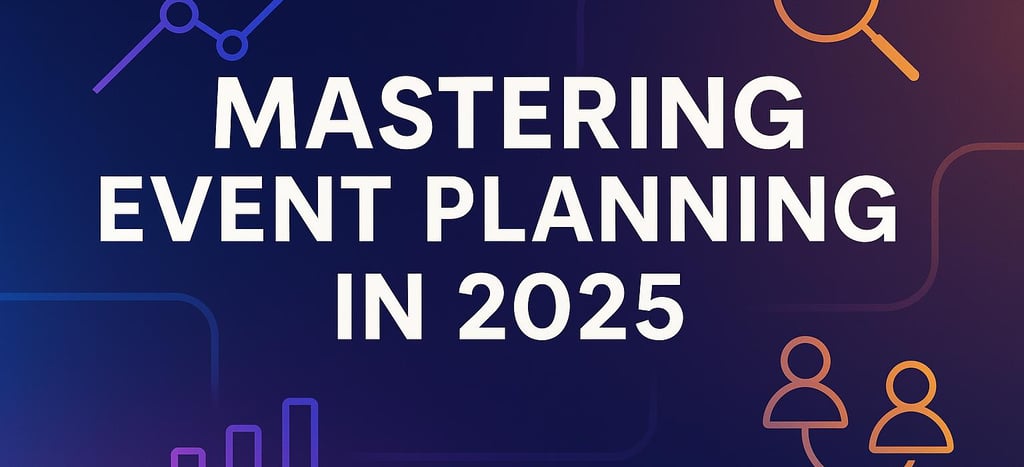Mastering Event Planning in 2025: Key Trends, Strategies, and Sourcing Tips
In 2025, successful event planning hinges on embracing personalization, leveraging advanced technology, and implementing strategic venue sourcing. This guide delves into the pivotal trends shaping the events industry, outlines a comprehensive planning approach, and offers actionable tips for effective venue selection to ensure memorable and impactful events.
Osvaldo Di Pietrantonio
4/4/20253 min read


Embracing the Top Event Trends of 2025
The event landscape has shifted dramatically post-2020, and 2025 reflects a mature, tech-enhanced ecosystem focused on human-centric experiences. According to recent event industry insights, here are the most impactful transformations:
1. Personalization at Scale
Attendees no longer settle for generic experiences. They expect hyper-personalized journeys, just like the algorithms on Netflix or Spotify. Smart segmentation, real-time data analysis, and AI tools allow planners to tailor agendas, content, and even room assignments based on individual preferences. This results in deeper emotional engagement and higher ROI.
2. AI Integration and Automation
AI isn’t the future—it’s already here. From chatbots that guide attendees through pre-event queries to predictive analytics that recommend the best networking matches, AI is streamlining every aspect of the event cycle. Planners using automated scheduling tools, smart badge tracking, and AI-assisted marketing campaigns report significant time savings and improved insights.
3. Accessibility and DEI as Standards
Diversity, equity, and inclusion (DEI) are no longer checkboxes—they’re foundational principles. Planners are proactively designing for accessibility, offering content in multiple languages, providing wheelchair-friendly layouts, and accommodating neurodiverse attendees. Tech platforms now include closed captioning, sign language integrations, and inclusive registration processes.
4. Data Privacy and Transparency
With GDPR and similar global regulations, transparency in data usage has become non-negotiable. Attendees want to know what data is collected, how it’s used, and where it’s stored. Planners must implement secure platforms and clear opt-in processes to maintain trust.
5. Hybrid and Micro-Events
While virtual events won’t replace in-person ones, hybrid models continue to rise. Small, local micro-events with global digital reach create a layered experience. Attendees appreciate the flexibility of choosing how and where to participate.
Event Planning Framework: From Concept to Execution
A successful event requires more than a checklist. According to recent industry best practices, a structured yet adaptive planning approach helps reduce friction and ensures alignment with business goals.
1. Set SMART Objectives
Start by defining Specific, Measurable, Achievable, Relevant, and Time-bound goals. Whether it's to generate 100 new B2B leads or increase brand visibility through press coverage, goals shape every decision.
2. Budget Strategically
Today's budgets need to accommodate hybrid technologies, content production, sustainable solutions, and premium experiences. Budget breakdowns should also allocate funds for contingencies and post-event analytics.
3. Choose the Right Format
Live, virtual, or hybrid? Selecting the right format depends on audience expectations, event goals, and available resources. Live events are irreplaceable for emotional connection, but virtual components allow scale and inclusivity.
4. Plan Attendee Journeys
From registration to post-event follow-up, map every touchpoint. Leverage behavioral data and surveys to anticipate needs and create surprise-and-delight moments. Personalized agendas, welcome kits, and AI-powered networking tools make attendees feel seen and valued.
5. Use Technology Intelligently
Deploy event management software to handle registration, engagement tracking, email marketing, and mobile apps. Choose platforms that are GDPR-compliant and allow API integrations for CRM, payment, and analytics.
Strategic Venue Sourcing: Tips for Success
The right venue can elevate your event—or create logistical nightmares. Recent industry sourcing guidelines emphasize the following:
Start Early: Top venues book fast, especially in peak seasons. Start sourcing 9–12 months ahead to secure availability and negotiate favorable rates.
Know Your Audience: Understand demographics, accessibility needs, and travel patterns. Central locations with strong transport links reduce friction and encourage attendance.
Use a Strategic RFP Process: Customize your RFPs with specific needs like outdoor spaces, sustainability credentials, or hybrid tech capabilities. Keep requests clear and concise.
Tour Virtually and In Person: Many venues offer 3D walkthroughs and digital floor plans. Still, nothing replaces an in-person visit to assess acoustics, lighting, and flow.
Consider Multiple Venues: For large events, using nearby venues for breakout sessions or pre/post functions can spread the experience and solve capacity issues.
Review Contract Clauses Carefully: Pay attention to force majeure, cancellation policies, attrition clauses, and service fees. Clarify responsibilities in writing.
Why You Should Invest in Professional Event Photography & Video
In an era where experience is currency, capturing your event professionally is essential—not optional. Visual content fuels your brand’s marketing, internal communications, and social media strategy long after the event ends.
At WEAR EVENTS, we specialize in photo and video production for high-end events across Europe. From corporate summits to luxury galas, our approach is discreet, cinematic, and strategically aligned with your brand.
Learn more:
For bookings and info: info@wear.events
Final Thoughts
The events industry in 2025 is a dynamic intersection of creativity, technology, and strategy. By embracing personalization, leveraging smart tools, sourcing venues strategically, and documenting every moment with professional visuals, you create not just a gathering—but an experience.
Want your event to live on long after the last guest leaves? Let us help you craft the story. Contact WEAR EVENTS to start planning your next unforgettable event.


